UMBC fails to report alleged gang rape involving basketball players on daily crime log
University of Maryland Baltimore County (UMBC) did not report an incident on the school’s daily crime log website involving four members of the school’s basketball team who allegedly gang raped a 19-year-old female athlete last year, according to a Baltimore County police report.
That omission may constitute a violation of the Clery Act, a federal law designed to inform the public about sexual assaults that occur on or around campus. Under the Clery Act, the U.S. Department of Education is authorized to fine federal financial aid participant institutions up to $35,000 for each violation.
The victim claimed she was gang raped at a dorm in August 2014 when four students were “running a train on her and passing her around,” according to a Baltimore County police report obtained by the Baltimore Post-Examiner. The four students were suspended, pending the outcome of a student judicial hearing, which eventually led to the expulsion of two students. The students were never charged.
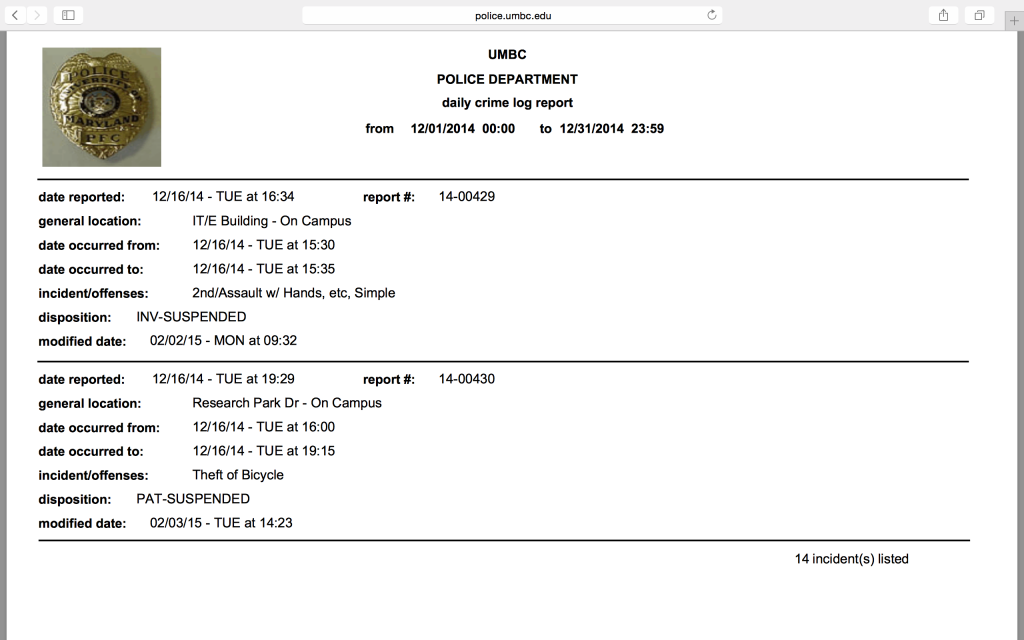
The alleged gang rape was omitted from the daily crime log website and also was not reported under UMBC’s Monthly Uniform Crime Reporting Statistics. UMBC did not confirm or deny the incident involved four basketball players. But police, as well as those familiar with the basketball program, told the Post-Examiner that the students were members of the Retrievers’ basketball team at the time of the incident.

UMBC spokesperson Dinah Winnick told the Post-Examiner the university complied with reporting requirements. Winnick said the daily crime log’s omission was based on the Baltimore County Police Department’s decision not to pursue charges.
“Consistent with the UMBC Police MOU (Memorandum of Understanding) with BCPD (Baltimore County Police Department), the university’s crime ledger includes incidents investigated by BCPD under the MOU when BCPD has determined that a crime occurred,” Winnick said.
However, the school’s explanation for not reporting the alleged crime on the daily crime log is not consistent with how the school reported another alleged rape on Dec. 5, 2014, where a 19-year-old student claimed she was raped on a stairwell inside the physics building. Baltimore County police determined that no crime occurred but that stairwell incident was reported on the daily crime log website. In addition, police also determined that a May 3, 2012 rape was unfounded, but listed on the daily crime log.
“The U.S. Department of Education’s The Handbook for Campus Safety and Security Reporting states explicitly, on page 95, that ‘If a reported crime is investigated by law enforcement personnel, and they determine that a crime did not occur, the log should indicate that the disposition of the crime is ‘unfounded.’ Any crime reported to an institution’s police or security department may not be excluded from the Clery Act crime log because police decide not to file charges or even if they determine it to be unfounded,” said S. Daniel Carter, director of 32 National Campus Safety Initiative.
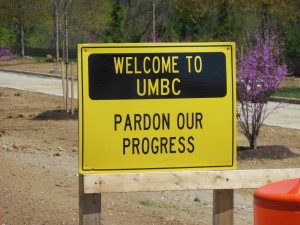
(Anthony C Hayes)
“The challenge of rape reports being unfounded because of a lack of ‘trauma informed’ interviews, and a perpetuation of ‘rape myths’ is one that affects the entire criminal justice system,” he added. “While it is an important means for thoroughly investigated false reports to be excluded from statistics, uninformed cursory investigations of reports that don’t necessarily conform to misperceptions of how a rape ‘should’ be reported can re-victimize survivors.”
Matt Kaiser, a white-collar criminal defense lawyer in Washington, D.C., also said the school must report the alleged sexual assault on the daily crime log.
“The Department of Education’s guidance on daily crime logs is clear — a school has to report an alleged incident, even if it is investigated by the police and they find a crime didn’t happen,” he said. “Then, the school is supposed to log the report and say the disposition was unfounded.”
The daily crime log consists of crimes reported to campus police that occur on the grounds of the school. Since 2010 there have been 22 reported sexual offenses, which led to three warrants, and two arrests, according to UMBC’s daily crime logs. No charges were filed in the 17 other cases, according to UMBC’s daily crime logs. Seven of those 22 sexual offenses on the daily crime log include reported rapes, No warrants or arrests were filed for any of the alleged rapes, according to the daily crime log.
For 2014, the reported rape on the daily crime log includes the Dec. 5 stairwell incident and a June 30 incident, which police cleared because there was not enough evidence to proceed in the case. The incident involving the basketball players, and the stairwell incident are omitted in the Monthly Uniform Crime Reporting Statistics, but are included in UMBC’s annual Campus Crime Statistics.
The Post-Examiner reviewed statistics from the daily, monthly and annual crime logs and found more inconsistencies:
- As of Oct. 13, the daily crime log for January 2012 is unavailable and says “file not found.”
- The daily crime log did not include a November rape in 2012, which was included in the Monthly Uniform Crime Statistics and the annual Campus Crime Statistics. The status of the case is listed as unknown.
- The alleged rape reported Dec. 5, 2014 is present on the daily crime log but omitted from the Monthly Uniform Crime Reporting Statistics.
The Post-Examiner conducted a 10-month investigation into the alleged gang rape. During the course of the inquiry, players, ex-players, coaches and several people close to the athletic department were interviewed. The Post-Examiner also filed several Maryland Public Information requests to obtain records from UMBC and the police.
Several attempts were made to talk to the suspects and the victim in the case, but they either declined comment or did not return requests for interviews.
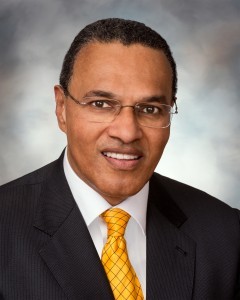
UMBC President Freeman A. Hrabowski III and Athletic Director Tim Hall also refused to be interviewed. Hall has not granted an interview to this news publication since the Post-Examiner broke a story in March about five upperclassmen who were suspended from the women’s lacrosse team for plotting to inflict serious bodily injury against several of their freshmen teammates.
Laura L. Dunn, who represents the victim, also serves as Executive Director of SurvJustice, an organization that advocates on behalf of sexual assault victims. She declined to comment other than to ask what is the Post-Examiner’s policy on identifying victims of sexual abuse.
The Post-Examiner does not publish names of victims of sex offenses. The Post-Examiner does not identify suspects accused of such offenses unless they have been charged with a crime or sued in a court of law.
The four suspects claimed the sex acts were consensual, according to the police report.

Charles W. Byrd Jr., Esq., who represents one of the accused, said, “My client was exonerated because he did nothing wrong.”
Dennis E. Boyle, Esq., who represents another one of the accused, declined comment.
During the course of a team practice conducted on July 9, the Post-Examiner had the opportunity to speak with rising star Rodney Elliott regarding the severity of his shoulder injury and related matters. Elliott denied any knowledge of the alleged sexual assault, which reportedly involved team members, referring the matter to coach Aki Thomas.
Thomas repeatedly declined comment for this story.
The injuries and suspensions significantly reduced the number of eligible players, which became the subject of a Baltimore Sun story, although that January 2015 article failed to mention why the players were suspended.
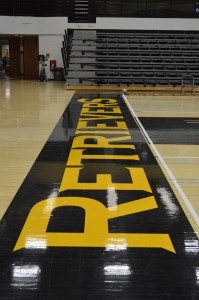
(Anthony C. Hayes)
At the player’s only practice, another player, Will Darley, who plays guard, pleaded similar ignorance: “We’re not going to answer any of your questions, have a good night!”
Students expelled
While the alleged gang rape occurred in August 2014, the victim did not report it to Baltimore County police until Dec. 17, 2014. She claimed she did not remember the August rape because of excessive alcohol consumption, according to the county police report obtained by the Post-Examiner.
Three months after the alleged sexual assault had occurred, a friend of the victim had informed her that the players were “running a train on her and passing her around,” according to the police report. The victim reportedly attempted to secure confessions by secretly recording conversations among the suspects to coerce a confession, according to the police report.
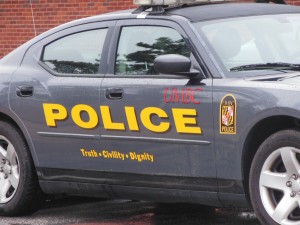
Baltimore County police heavily redacted the 14-page report of the incident, but did not redact particular words such as “members of the team,” “coach,” and “players.” Police redacted the names of the suspects, victims and attorneys in the police report because “the personal information contained in the police report may become a part of a student record,” said Baltimore County Officer Shawn Vincent, special assistant to the county attorney.
Baltimore County Police Detective Nicholas A. Tomas contacted Campus Police Major Paul Dillon who ordered Detective Chester Smith to assist with the county’s investigation, according to the police report. Smith confirmed to the Post-Examiner the suspects were UMBC “basketball players” and said “players were expelled.”
Winnick confirmed that two students were expelled “in early 2015” after student judicial hearings were held in December. She did not explain why the other two students were not expelled.
Baltimore County Police had asked the school not to go forward with their student judicial hearing until the criminal investigation ended. UMBC ignored that request and officers were not called to testify at the hearing, the county police report said.
However, UMBC did not immediately remove the two expelled students from the Retrievers’ roster.
The roster changed several months later after the Post-Examiner had asked why players were not removed. It is unclear if any of the suspended players were allowed to sit on the bench or participate in practice or other basketball functions.
“If a student athlete is suspended he or she cannot practice or compete because he or she is technically not enrolled. Keeping that student athlete in the roster is generally, technically, not a violation” said NCAA spokeswoman Meghan Durham.
Since the incident one of the other suspects who was not expelled transferred to another school and the victim also transferred, according to coaches and sources familiar with the case.
UMBC students and parents react
The failure to include the most recent incident from last year on the daily crime log has provoked outrage among students and parents.
“I heard nothing from the school. It was swept under the rug because it involved a sports team, and that’s an alarming trend. They should be more transparent about any wrongdoings,” said Grace Chandler, 20, who is majoring in computer science. “[UMBC] is so proactive with other social issues, so it’s sort of baffling” that this wasn’t addressed.
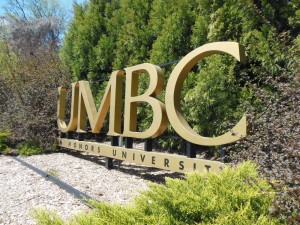
An 18-year-old global science major who declined to give her name was equally frustrated. “These people [athletes] are ‘quote unquote’ public figures. The basketball team represents our school, so it makes sense why they would try and keep it quiet. Had it been some art student, it would’ve been handled differently. Everyone makes UMBC seem so safe, and I came to UMBC because I thought it was safe”
Another student said she is concerned about her own safety.
“It makes me feel less safe that things could be going on and we don’t know about them,” said a 17-year-old student who asked that her name not be used. “Some incidents are bound to happen, even at the safest college. But they owe it to their students to at least let them know that something is going on, to at least make them alert…We need a campus-wide alert, whether it’s alleged or [proven]. Whether it’s true or not, I’d want to know. What else is happening that they don’t tell us about?”
Others want more transparency.
“It’s definitely a concern that the school didn’t alert students,” said Kellie Schmidt, 19, a computer science major.
And some suggested the school is more interested in protecting its reputation than its students.
“They should’ve put that [information] out there. I think every school should do that. But they want to protect their reputation,” said Tori Schmidt, 21, an education major.
A concerned parent who is worried about his daughter called it “unacceptable.”
“There’s no situation that would warrant them [UMBC] not reporting [the alleged gang rape] on the daily crime log,” he said under the condition his name would not be used out of fear of retaliation from the school. “The number one priority of a university should be to protect the welfare of its students and [this episode represents] an utter failure of their responsibility.”
Police Report
Here are excerpts from the county police report with the redactions that explain the victim’s account of the incident:
[The victim] advised that on an unknown day in the middle of August (2014), she went to a party located at ***** Winters Lane at approximately 2100 hours. [The victim] advised she went to the party with a few friends at which time they drove together.
[The victim] advised while at the party, she drank too much alcohol (jungle juice, Bacardi, and Jell-O shots) and she does not remember most of the night.
[The victim] advised she remembered waking up lying on the floor in her underwear and a t-shirt that did not belong to her.
[The victim] advised in October (unknown date) she was in the study hall of the college at which time she was talking to ******* from the ********. ****** advised while speaking to *****, ****** “slipped” and told her something about “running a train on her and passing her around,” on the night of the party.
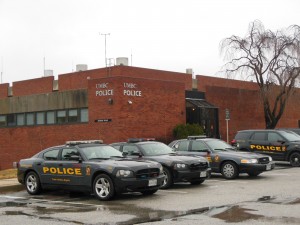
While the victim could not recall particular details of the incident, according to the police report, the four suspects had a clear memory of the incident when they were interviewed by police in December. The suspect’s stories appear to be identical, including the same type of graphic language and sex positions, according to the report. The suspects told the police that the sex acts were consensual.
**** walked into the door which leads into the common area of the dorm suite. ***** observed **** on the floor lying on his back and [the victim] straddling his groin area. Additionally, he observed the while [the victim] was straddling ****** she was simultaneously performing fellatio on *****. ****** stated that he believed that while [the victim] was straddling ****** they were engaging in vaginal intercourse.
The victim also attempted to secure a confession from the suspects by means of electronic recording, according to the police report. The victim offered the recording to Baltimore County Police Detective Tomas, but he declined to listen to the tape, the report said. During a Dec. 31 follow-up interview the detective warned the victim that unauthorized recordings are illegal.
He also told the victim that her story was not credible because for “some of the sex acts to be performed, she would have had to be conscious to participate.”
The victim then admitted “that she did in fact engage in sex acts” with one of the suspects after the August incident, according to the police report.
The detective then pressed her on why she tried to illegally tape the suspects. The report noted the following:
[The victim] stated that she was trying to get them to admit to sexually assaulting her, so she could prove to her boyfriend that she did not consent to the sexual encounters. [The victim] further advised that she had no intention of making a big issue out of this incident. She stated that she never had intentions on involving the police; her father insisted upon reporting this incident to the police. Detective Burrows [other investigating officer] asked [the victim] what was making her upset and her reason for wanting the school to do something to the alleged suspects. [The victim] stated that she was angry because the boys had initially lied to her when she asked them if anything happened.
The detective then told the victim the case was closed because no criminal act had taken place.
Lauren Molander contributed to this article.

Bryan is an award-winning political journalist who has extensive experience covering Congress and Maryland state government.
His work includes coverage of the election of Donald Trump, the confirmation hearings of Supreme Court Justice Brett Kavanaugh and attorneys general William Barr and Jeff Sessions-as well as that of the Maryland General Assembly, Gov. Larry Hogan, and the COVID-19 pandemic.
Bryan has broken stories involving athletic and sexual assault scandals with the Baltimore Post-Examiner.
His original UMBC investigation gained international attention, was featured in People Magazine and he was interviewed by ABC’s “Good Morning America” and local radio stations. Bryan broke subsequent stories documenting UMBC’s omission of a sexual assault on their daily crime log and a federal investigation related to the university’s handling of an alleged sexual assault.

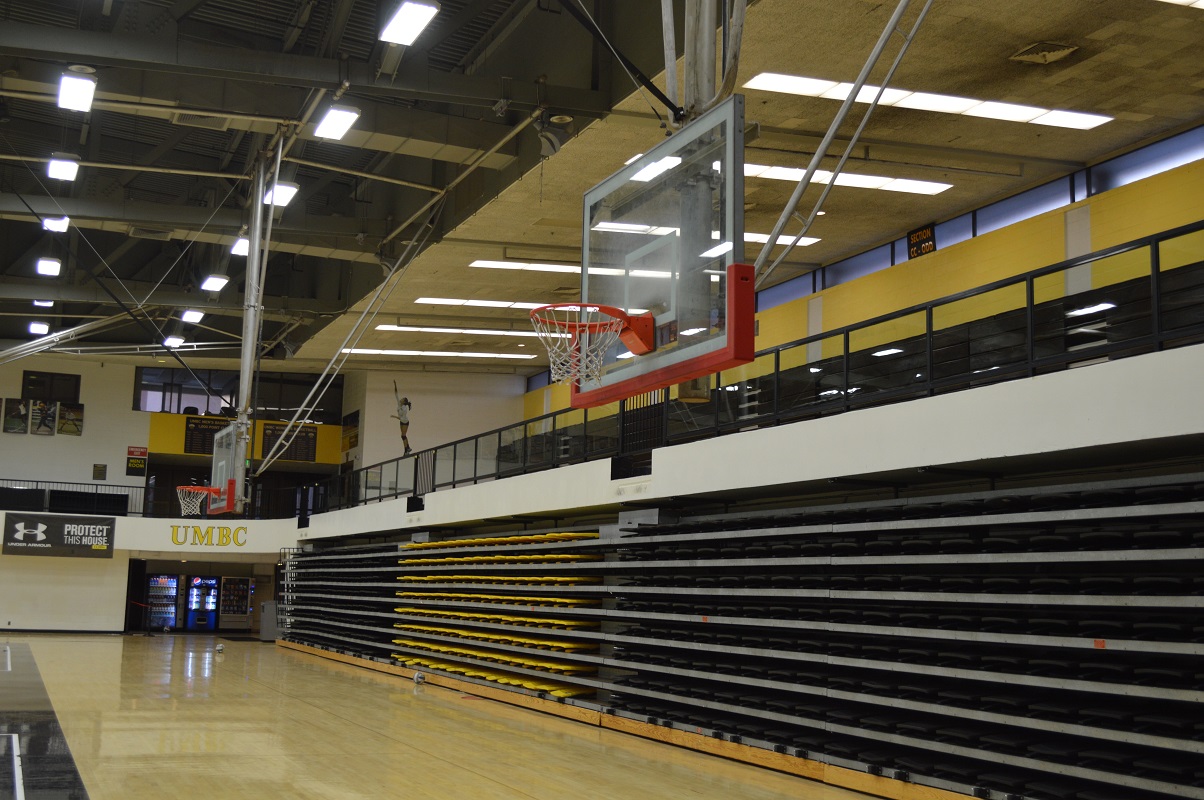
The allegation was reported to campus police by Baltimore County police. It should also be noted that the statute does require the victim to be the party which reports to campus police.
I see a few places in the police report where it mentions the Detective from County Police being in communication with Major Dillon of Campus Police, mainly to request information on the students. It doesn’t seem to say anything about a report being opened, and the lack of information on the crime report says that it likely wasn’t.
Unless you found another source which mentions a report and incident number from Campus Police, everything I’ve seen shows that there was no report.
Crime logs only need to include things reported to the campus police.
It’s mentioned multiple times in the Handbook you linked.
The rape allegation was reported directly to county police, not campus police.
Therefore, campus police don’t need to report it in the log.
Additionally, the uniform statistics shouldn’t include unfounded crimes,
which this would be, so it wouldn’t be there either.
Therefore, absolutely nothing in this article makes sense or matters, especially the manufactured outrage from students who don’t understand that if they want information regarding unfounded cases opened handled by county police, they have to ask county police.